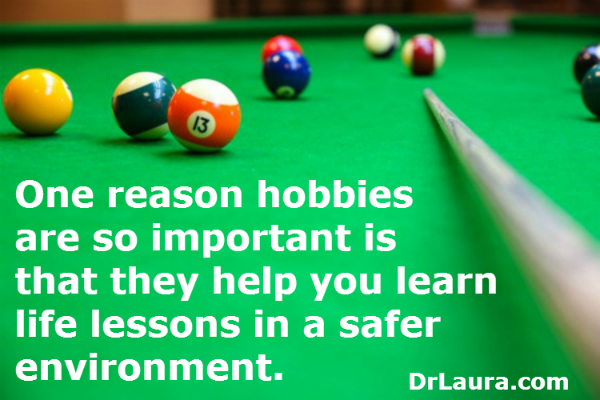(originally published August 26, 2010)
I’ve been taking lessons in shooting pool now each week for two years. My teacher, Al Vafa, is a pro: an interesting, funny, smart, thoughtful guy, and a magnificent pool player.
If I am in the right mindset, the average “not that serious” pool player would have a hard time beating me. Again, that is
if I am in the right mindset. It took the better part of the first year of lessons to stop saying “I suck,” to stop crying, getting angry, and even once actually breaking my costly pool cue.
This was not just about pool. This was a metaphor for my life. My dad was ferocious with me. I remember the day before a science project was due for a school science fair, I went into the back yard, picked out some flowers, pulled them apart, glued them onto a poster board, and named all the parts. It wasn’t very neat, and it wasn’t very brilliant, but it was something to hand in so I wouldn’t get into trouble. My dad came home, took one look at it, and went ballistic. I was up most of the night with him, tears streaming down my face the whole time, redoing the project in HIS image.
The next day at the science fair, when the judges came to my “perfect” project, I said…nothing. They asked me questions. I remained silent. They prodded me some more, but I remained silent. Finally, writing on their pads, they moved on.
One of my teachers called my parents that night to find out what in the heck was wrong.
My dad, furious we had done all that work and then I hadn’t presented it properly, demanded to know why I said nothing. Fearfully, I answered, “Because it wasn’t mine.” I honestly don’t remember what he said after that, but this was the atmosphere during all my “growing-up” years.
Two things came from that experience: one really good, and one really bad.
The really good part was I became highly motivated to prove to him I wasn’t “stupid” (as he constantly called me). That gave me self-motivation and a drive to work very, very hard.
The really bad part was I found it hard to forgive myself the realities of a learning curve (i.e., it takes time to master things). I was hard on myself when I couldn’t do well quickly.
What does this have to do with shooting pool? It has been magnificent therapy.
After the breaking of the cue stick, I struggled to remove my emotions and accept the learning curve and the reality even pros miss sometimes. I learned my mind had to be clear of self-recrimination in order for my body and brain to work on the strokes. I learned I could have fun while not being perfect (something my dad never learned in his life).
I also got this lesson from learning how to sail: doing my job (steering) and working with a team (the boat’s crew).
This is one reason hobbies are so important: they help you learn life lessons in a safer environment.
I am grateful for all the friends and teachers who have helped me appreciate life more and enjoy myself in a deeper way.
